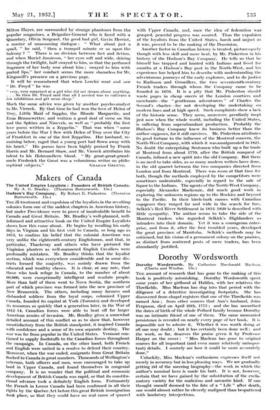Makers of Canada
The United Empire Loyalists : Founders of British Canada.
ButterWorth. I5s.)
Tim ill-treatment and expulsion of the loyalists in the revolting colonies form one of the saddest chapters in American history, but under Providence were to prove of incalculable benefit to Canada and Great Britain. Mr. Bradley's well-planned, well- inforMed and attractive book on the United Empire Loyalists shows how this came about. He begins by recalling his early days in Virginia and his first visit to Canada, so long ago as 1873, to confirm his belief that the colonial American was very unlike the eighteenth-century Englishman, and that, in particular, Thackeray and others who have pictured the Virginian planters as well-mannered English Cavaliers were profoundly mistaken. Mr. Bradley thinks that the loyalist section, which was everywhere considerable and in some dis- tricts formed the majority, was mainly drawn from the educated and wealthy classes. It is clear, at any rate, that those who took refuge in Canada, to the number of about 00,000, were exceptionally intelligent and resolute people. More than half of them went to Nova Scotia, the southern part of which province was formed into the new province of New Brunswick. The others, including many farmers and disbanded soldiers from the loyal corps, colonized Upper Canada, founded its capital at York (Toronto) and developed its resources so quickly that a generation later, in the War of 1812-14, Canadian forces were able to beat off far larger American armies of invasion. Mr. Bradley gives a somewhat detailed account of this conflict so as to show that, however unsatisfactory from the British standpoint, it inspired Canada with confidence and a sense of its own separate destiny. The war was far from popular in the United States. Vermont con- tinued to supply foodstuffs to the Canadian forces throughout the campaign. In Canada, on the other hand, both French and English were united in a resolve to defend their country. Moreover, when the war ended, emigrants from Great Britain Socked to Canada in great numbers. Thousands of Wellington's veterans, both officers and men, were encouraged to take up land in Upper Canada, and found themselves in congenial company. It is no wonder that the political and economic development of British Canada was rapid, or that its constitu- tional advance took a definitely English form. Fortunately the French in Lower Canada had been confirmed in all their rights by the Quebec Act before this great British immigration took place, so that they could have no real cause of quarrel
with Upper Canada, and, once the idea of federation was grasped, peaceful progress was assured. Thus the expulsion of the loyalists from the United States, harsh and unjust as it was, proved to be the making of the Dominion.
Another factor 'in Canadian history is treated, picturesquely though with less skill and more heat, by Mr. Pinkerton in his history of the Hudson's Bay Company. Ile tells us that he himself has trapped and hunted with Indians and lived for months at a Hudson's Bay post in the North-West, and his experience has helped him to describe with understanding the adventurous journeys of the early explorers, and to do justice to ltadisson and Groseillers, the two seventeenth-century French traders through whom the Company came to be founded in 1670. It is a pity that Mr. Pinkerton should waste pages in cheap sneers at the London courtiers and merchants—the " gentleman adventurers " of Charles the Second's charter—for not developing the undertaking on modern lines and at high speed. Such complaints show a lack of the historic sense. They seem, moreover, peculiarly inept just now when the whole world, including the United States, is suffering from superabundant production. Probably the Hudson's Bay Company knew its business better than the author supposes, for it still survives. Mr. Pinkerton attributes its good fortune to the influence of the Montreal concern, the North-West Company, with which it was amalgamated in 1821. No doubt the enterprising Scotsmen who built up a fur trade at Montreal from about 1770, after the British conquest or Canada, infused a new spirit into the old Company. But there is no need to take sides, as so ninny modern writers have done, in the old quarrel between the two companies directed from London and from Montreal. There was room at that time for both, though the methods employed by the competitors were sometimes undesirable, especially in regard to the sale of liquor to the Indians. The agents of the North-West Company, especially Alexander Mackenzie, did much good work in exploring the unknown regions up to the Rockies and beyond to the Pacific. In their birch-bark canoes with Canadian voyageurs they ranged far and wide in the search for furs. Selkirk's Red River Settlement in 1812-1820 is described with little sympathy. The author seems to take the side of the Montreal traders who regarded Selkirk's Highlanders as intruders into their domain. Yet it was a courageous enter- - prise, and from it, after the first troubled years, developed the great province of Manitoba. Selkirk's methods may be criticized, but his vision of a permanent colony on the prairies, as distinct from scattered posts of mere traders, has been abundantly justified.




































 Previous page
Previous page